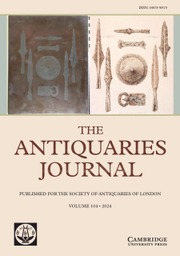Article contents
Excavation and Survey at St Patrick's Chapel and St Peter's Church, Heysham, Lancashire, 1977–8
Published online by Cambridge University Press: 21 April 2011
Summary
This paper reports excavations in 1977 and 1978 at the chapel and adjoining cemetery of St Patrick's, Heysham, and an architectural survey of the nearby church of St Peter's. The chapel initially comprised a single-celled, stone-built structure, plastered inside and out. Associated with it were pieces of painted plaster, two bearing letters, and, in all probability, a stone carved with a bird's head, perhaps of late seventh- to late eighth-century date. The chapel was subsequently enlarged. One burial included a bone comb of Anglo-Scandinavian type, and calibrated radiocarbon dates for three skeletons range between AD 960 and 1185.
This report was submitted for publication in March 1992.
- Type
- Research Article
- Information
- Copyright
- Copyright © The Society of Antiquaries of London 1994
References
- 6
- Cited by


